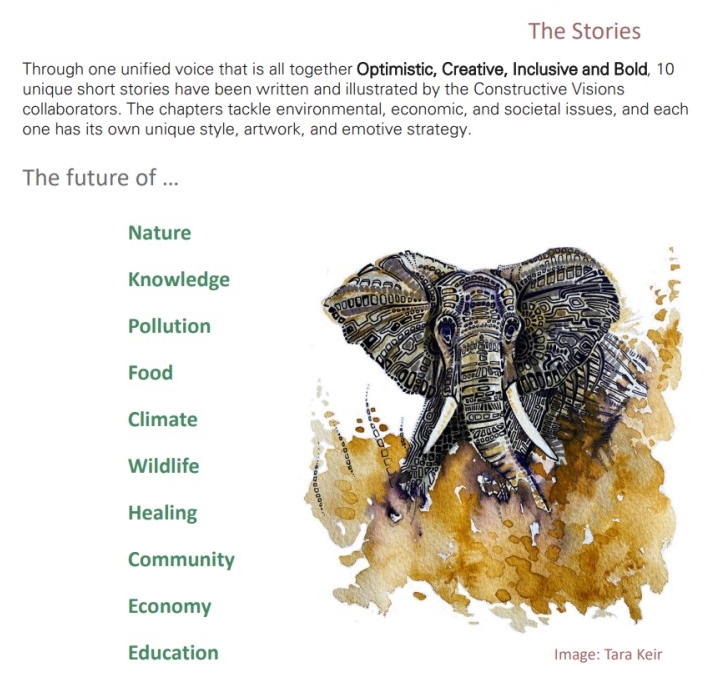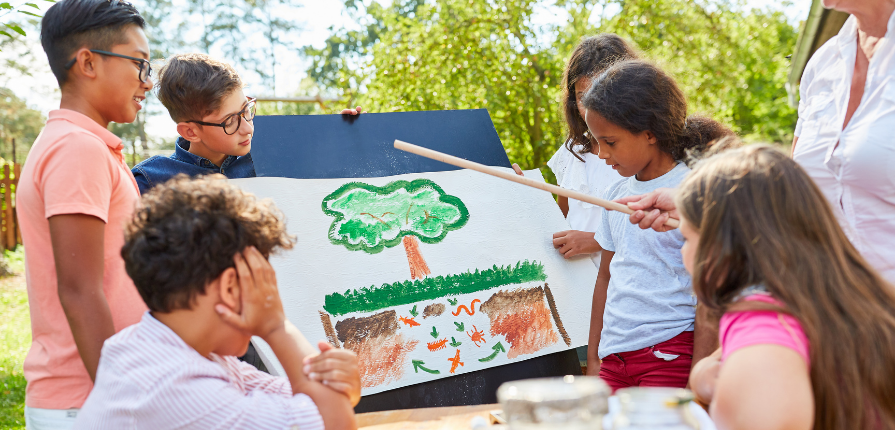Climate emergency, environmental disaster, natural catastrophe … this situation can feel hopeless and sometimes leave people feeling like there is nothing significant they can do to help. Yet there is so much we can do and so much we need to do, and we can start with information, intrigue and education.
Are you wondering how to get teenagers and young learners engaged in climate action, and keep them engaged?
Empowering young people is key: helping them discover that they really can make a difference.
STEM Ginger Education does this by setting up engaging, thought-provoking activities that provide young people with opportunities to speak up and get their voices heard.
The Power of Story-telling: Constructive Visions
Constructive Visions is a group of ecologists, designers, conservationists, engineers, and many more wonderful people, that have written beautiful stories, envisaging a positive and healthy post-pandemic world. The stories provide a springboard for imagination and change.

Partnering with Constructive Visions, STEM Ginger Education has brought together learners in Catalunya, Wales, the US and Philippines, to read, discuss and reflect on, these stories. The teenagers’ insightful reflections, reveal just how powerful story-telling can be, and how creative and inspiring young people are when given the chance to shine.
The Future of Wildlife
What if animals could talk, would we reconsider our treatment of the natural world? Carlota and Janna certainly think so:
Dear animals, I am disgusted and appalled to learn the pain and suffering that humanity has imposed on you during centuries … many turned to poaching for survival and I apologize for that. I feel like I have been shielded from your misery and your agony has been disguised by cute pictures of your offspring flooding social media, and that must stop. We have to look for sustainable ways to fund protection for wildlife.
I believe that the new generations will make the real change. Teaching the little ones all about the issues and problems that previous generations have created, and proposing possible solutions, can inspire them to find new solutions and overall make them conscious of the issues from an early age (so they have this present as they grow up, and make a sustainable impact on the world).
This, though, is directed to the future, and will not give immediate results. As governments hold so much power, it should be them that share programmes about this, implement a mandatory subject in schools or even implement laws that force the citizens to obey and follow certain rules (limiting their footprint or enhancing sustainability) if they don’t want to encounter legal problems.
We are very sorry for everything you have been put through, but the best way to apologize is to make a change, and that is our objective.
Humans
The next environmental education activity, encouraged our teenagers to consider Nature-based solutions, and the following super interesting, original and creative ideas were suggested:
- Regreening our cities (Carlota)
- Chilli as an aesthetic (Finn)
- End of life burial options (Ayesha)
The next chapter we read was …
The Future of Knowledge
In this story, the learners read postcards written by different people five years in the future, people with a variety of work and life experiences.
The teenagers then wrote letters from their future-selves, reflecting back on Covid-19 times, and how it had impacted their young lives. How important it is for us to hear how young people have been feeling as Covid-19 changed all of our worlds:
Dear world, … Schools have now introduced an obligatory subject: ‘sustainability’. In this subject, children are taught about the science behind climate change, global warming etc.
They are also taught skills to apply at home, such as how to conserve food for longer, how to compost, how to upcycle clothes and objects, and how to plant. Little children are becoming more conscious and are making these DIYs that, apart from keeping them entertained, are also beneficial for the environment.
Pollution has not improved as much as it would be desired, but measures will be taken briefly. Barcelona is much greener now and the population is much more conscious and determined to make changes.
Janna Nathurmal Lamas
Dear World, When the pandemic started I was a shy 14 years of age and the idea of having a 15 week vacation from the constant stress of school did not sound dreadful, it (ironically) felt quite liberating.
Of course I had no way of imagining how those 15 days would extend to 3 months and almost 2 years of covering my face with a mask. Because of these constant restrictions I learnt to feel hatred towards the virus. I hated it for robbing me of my freedom, my teenage years, my friends even. … The pandemic hit at a moment of a grand technological expansion and it seemed that society had fallen into the temptation of social media and the internet as a whole.
Walking through the streets people had their faces turned down, eyes glued to the blueish light of their screens. Because we had the liberty to do everything we didn’t use, we didn’t see it as a privilege … Three years after the pandemic when I walk around my city I again see faces, they aren’t looking at their phones, they aren’t obscured by cloth, they are observing. It is only when society is deprived of their freedom that they learn to value it.
Carlota Herrera
Environmental Education Activities with STEM Ginger Education
Young people want to act and ensure a healthy, happy future with sustainable industry and a thriving natural world. Join STEM Ginger Education’s environmental education activities that really do empower our learners and show them that they most definitely can make a difference:
We look forward to you joining in!




